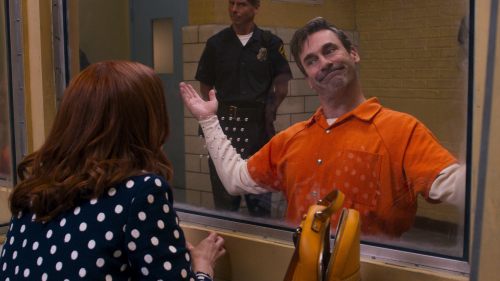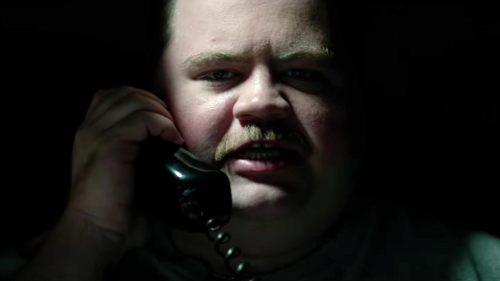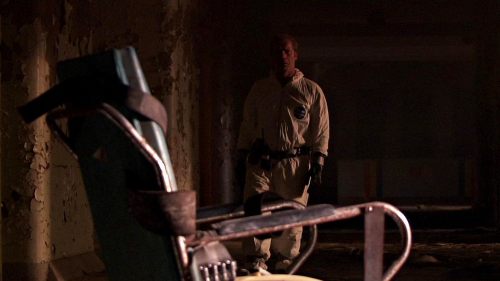BEIRUT Review: Jon Hamm In Le Carré Lite
The story goes: Tony Gilroy's script for Beirut is twenty years old, and sat in a drawer for that long, as he rose through the ranks of Hollywood (to Bourne mastermind and BTS Star Wars doctor), trying to get it made on several stops along the way. That gestation period could account for why Beirut feels somewhat old fashioned – a muscular, morally hazy dialogue and performance-driven bit of mid-level adult pulp fiction that doesn’t make a whole lot of money at the box office. Had Beirut premiered in ‘98 alongside paranoia thrillers such as John Frankenheimer's Ronin or Brian De Palma's Snake Eyes, it'd feel right at home: a healthy alternative to pure blockbuster fare that owns a somewhat broken ethical compass for its characters to follow.
Directed by Brad Anderson (Session 9, Transsiberian), Beirut is John Le Carré Lite, finding a professional mediator (Jon Hamm) recruited by a group of CIA agents to negotiate the release of an American hostage in the titular, war-rocked Middle Eastern city. It's a film fans of Gilroy will recognize, due to the tightly plotted structure, as Hamm’s essentially playing the international flipside to Michael Clayton's legal fixer: a haunted burnout who’s nevertheless incredibly skilled when he's not drinking himself into oblivion. With the aid of Anderson's rather patient lens, Beirut develops into an aggressively middlebrow motion picture, with numerous twists that make up for any lack of big picture ponderousness.
That's not to say Anderson and Gilroy's movie isn't trying to capture and then comment upon a fairly broad historical snapshot. We pick up with Hamm's Mason Skiles in '72, where he's a smooth-talking cultural ambassador. At an embassy dinner he's hosting at his home, he waxes on about the city, referring to it as “the Paris of the Middle East” – describing the numerous challenges that this melting pot of Palestinian and Israeli conflict has in its future. At the moment, the Munich Olympic massacre is at the front of everyone’s minds, and Skiles can sense Israel's impending retaliation in the stars. That's the last thing Beirut needs (according to our guide). “As soon as the talking stops, the fighting starts,” he says and the brief insight becomes a perfect encapsulation of his character – a man who thinks you can resolve any disagreement with an expertly outlined deal.
Unfortunately for Skiles, an invasion at this soiree sees the antithesis of his "speak first, shoot never" philosophy, as his colleague Cal (Mark Pellegrino) comes bursting in, saying that Mason and his wife (Leïla Bekhti) need to hand over the Palestinian boy Karim they’ve been working toward adopting. It seems Karim's brother may have been involved in Munich (leaving a vehicle near the bombing site with his prints on it), and the kid’s now needed for questioning. Before Mason can talk Cal and his accompanying Agency goons down off the ledge, shots are fired in his home, as the boy's sibling storms this castle by force, snatching Karim away and killing Skiles' better half in the process.
Flash forward 10 years and Mason is now a shattered soul; heading up a two-man firm who tries to help settle local labor disputes in the States before retiring to his hotel room (or the nearest bar) and swilling whiskey until he can't see. While that may sound like the later stages of Don Draper's post-ad man disintegration in Mad Men, Hamm does an exceptional job shedding that character's handsome skin and transforming Skiles into a character all his own. Because even at his weakest, Mason is the smartest guy in the room, and – should a hypothetical sales meeting occur between the two fictional fast-talkers – it wouldn't be hard to imagine him spitting logical circles around Don's pretty head, getting him to agree to whatever Skiles desires. Hamm has long been searching for a script that could help him performatively flex the way he did with Matthew Weiner, and Beirut is it - terse, shaded, and full of rhythmic chatter.
Mason is blasted at a bar outside Boston when a recognizable figure re-enters his life with an envelope of cash and mysteriously requests he return to the city where he lost everything. It seems Cal's kidnappers – members of a Palestinian fringe group – specifically requested Skiles’ mediating skills. Of course, Mason rejects the task but eventually agrees (the only real “hero’s journey” nonsense that’s tossed into Gilroy’s tome), yet upon arriving in the Middle East, his CIA and White House contacts can't see past the sheen of booze he keeps sweating out under the scorching Lebanon sun. Mason quietly navigates this arena of shady double crosses and dubious political motivations, with the help of liaison Sandy Crowder (Rosamund Pike), who may or may not be the only person the diplomat can trust on his unlikely mission to rescue a friend he hasn't spoken with in a decade.
As good as Gilroy's script is – the musical cadence and punchy back-and-forths leading one to wonder why the hell it took twenty years to get cameras to roll on it – Beirut's supporting cast might be its most valuable asset. Shea Whigham continues to make everything he appears in that much better (regardless of the part's size), and steals numerous scenes as an uptight bureaucrat who side-eyes Mason's every choice. Dean Norris (sporting a goofy rug and spectacles) gets to go against type, creeping around the story’s edges like a little weasel, his typical snarling policeman typecasting gone completely. Pike is almost a noir femme fatale: an equally (if not more) underestimated figure than Mason by her male co-workers, who could be the key to Skiles' quest, should Crowder not be secretly harboring her own agenda.
Brad Anderson has always been a fundamentally sound director, from the long, digital tracking shots of Session 9, to the lurching darkness engulfing Christian Bale's emaciated performance in The Machinist. With Beirut, his years working at HBO (helming episodes of everything from The Wire to Boardwalk Empire) shine through, as he's perfectly capable of bringing these numerous operatives’ words to life as they're slung like weapons. There's a restraint to his monochromatic frame that recognizes this is essentially a writer’s picture, but that doesn't stop cinematographer Björn Charpentier (shooting only his second feature) from slathering each frame in a wash of beautiful brown exteriors and stark primary color interiors. Beirut is a rock-solid work of programmer craftsmanship and should be applauded as such.
By the final reel, the numerous narrative loops Beirut propels the audience through become somewhat exhausting, but Anderson, Gilroy and Hamm bring it all to life with understated flair. There's even some scathing political commentary regarding the principles of America’s involvement in the Middle East during the Reagan era – that have only become more tragically complex and corrupt in the thirty years since – that remind us how all the sides contributing to that once great city’s decay are operating with their own interests at heart. In a way, Beirut acts just as much like an invented time capsule as it does a highly competent potboiler, showcasing a metropolis in mid-crumble, just before full-scale disaster sets in.
Beirut is available now on Blu-ray, DVD and VOD.



